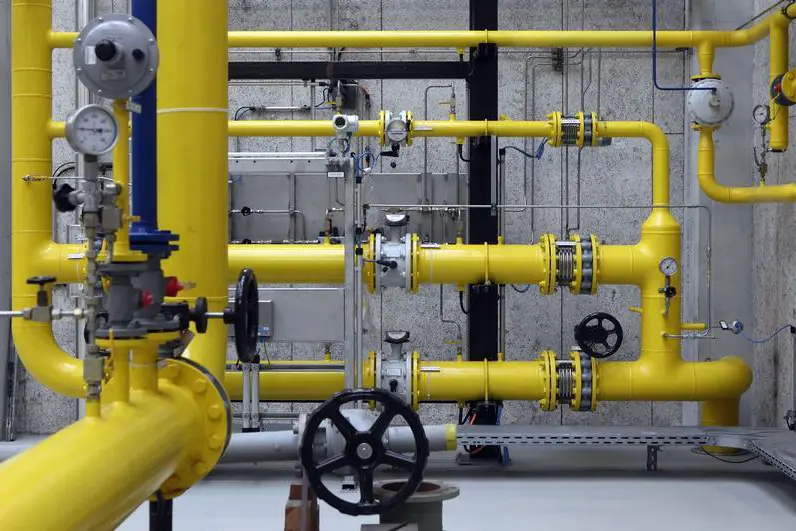PHOTO
BEIRUT - Lebanon will have no problem exporting gas if oil companies discover the resource off the country’s coast, a British energy law expert said. “Globally there is an increasing demand for gas. China and south East Asia still have lot of demand for gas. This means that there is an opportunity for gas producers and Lebanon is one of them once the country starts drilling,” John Paterson, director of Aberdeen University Center for Energy Law, told The Daily Star.
Paterson, who was invited by the American University of Technology to give a lecture at the Lebanese Bar Association, argued that fossil fuel will remain the main source of energy for decades.
“There is an opportunity for Lebanon to supply Europe with gas once this commodity is discovered,” he said.
On Dec. 14, Lebanon’s Cabinet approved the offers of a consortium of international oil companies to explore for natural gas in maritime blocks four and nine.
France’s Total, Italy’s ENI and Russia’s Novatek will conduct extensive studies and surveys in 2018 and start actual exploration in 2019.
Lebanese officials hope this move eventually paves the way for Lebanon to join the club of oil-producing countries.
Paterson stressed that gas is more environmentally friendly than other fossil fuels, such as oil and coal.
“For sure we need renewables but renewables still cannot replace natural gas in the short and medium term,” he added.
Paterson noted that one has to look at growth in demand for energy, the rise in population and the increase in the standard of living in emerging economies to grasp the importance of natural gas in the global economy.
“Technology can make significant changes [in energy]. But at the moment all the projections indicate that we need to count on fossil fuel. If we wanted to use fossil fuel then we have to use [one that is] less damaging to the environment and for this reason gas is the answer,” he added.
Asked about the possibility that Lebanon will not discover sufficient gas for commerical trade, Paterson said there are always risks when it comes to oil and gas exploration.
“In the Levant basin we know hydrocarbons are present in these countries, including Lebanon. However, until we actually drill we won’t know if there are actually hydrocarbons in these formations. There is no alternative to drilling to discover if there are commercial quantities in these blocks,” he said.
Paterson believes there are no certainties in gas and oil exploration.
He added that the companies which will start drilling for gas in Lebanon are counting on the seismic data the government collected.
“If Lebanon does discover commercial quantities of gas in the next two or three years, this will make the other areas more attractive to new companies in the future,” he said.
Paterson insisted that the dispute between Lebanon and Israel over the 870-kilometer-long maritime stretch will not discourage the oil companies from drilling as long as they are far away from the contested areas.
He added that international laws usually solve these disputes and many countries have sought the rulings of the international tribunal to solve these problems.
Paterson, who was invited by the American University of Technology to give a lecture at the Lebanese Bar Association, argued that fossil fuel will remain the main source of energy for decades.
“There is an opportunity for Lebanon to supply Europe with gas once this commodity is discovered,” he said.
On Dec. 14, Lebanon’s Cabinet approved the offers of a consortium of international oil companies to explore for natural gas in maritime blocks four and nine.
France’s Total, Italy’s ENI and Russia’s Novatek will conduct extensive studies and surveys in 2018 and start actual exploration in 2019.
Lebanese officials hope this move eventually paves the way for Lebanon to join the club of oil-producing countries.
Paterson stressed that gas is more environmentally friendly than other fossil fuels, such as oil and coal.
“For sure we need renewables but renewables still cannot replace natural gas in the short and medium term,” he added.
Paterson noted that one has to look at growth in demand for energy, the rise in population and the increase in the standard of living in emerging economies to grasp the importance of natural gas in the global economy.
“Technology can make significant changes [in energy]. But at the moment all the projections indicate that we need to count on fossil fuel. If we wanted to use fossil fuel then we have to use [one that is] less damaging to the environment and for this reason gas is the answer,” he added.
Asked about the possibility that Lebanon will not discover sufficient gas for commerical trade, Paterson said there are always risks when it comes to oil and gas exploration.
“In the Levant basin we know hydrocarbons are present in these countries, including Lebanon. However, until we actually drill we won’t know if there are actually hydrocarbons in these formations. There is no alternative to drilling to discover if there are commercial quantities in these blocks,” he said.
Paterson believes there are no certainties in gas and oil exploration.
He added that the companies which will start drilling for gas in Lebanon are counting on the seismic data the government collected.
“If Lebanon does discover commercial quantities of gas in the next two or three years, this will make the other areas more attractive to new companies in the future,” he said.
Paterson insisted that the dispute between Lebanon and Israel over the 870-kilometer-long maritime stretch will not discourage the oil companies from drilling as long as they are far away from the contested areas.
He added that international laws usually solve these disputes and many countries have sought the rulings of the international tribunal to solve these problems.
Copyright © 2017, The Daily Star. All rights reserved. Provided by SyndiGate Media Inc. (Syndigate.info).





















